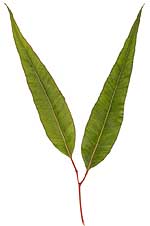Eucalyptus Essential Oil

Considering that the genus eucalyptus contains nearly 600 species, it's no wonder that the various eucalyptuses make nearly 75% of Australia's native flora. Of the 20 or so species used commercially 3 are routinely used in aromatherapy. They are:
* Sweet eucalyptus (Eucalyptus globulus)
* Common Eucalyptus (Eucalyptus radiata)
* Lemon Eucalyptus (Eucalyptus citriadora)
Eucalyptus oils are produced by steam distillation of the fresh leaves. Nearly all eucalyptus oils are rectified, or re-distilled in the absence of oxygen to remove unstable chemical components which could threaten the shelf life of the finished essential oil.
Unfortunately, the amount of processing needed to achieve a stable product changes the scent so dramatically that the finished oil smells almost nothing like the freshly picked leaves from which it's made.
Eucalyptus in Aromatherapy
Eucalyptus is used mainly for its alleged antimicrobial properties. Attempts to verify this oil's usefulness scientifically have produced mixed results but the lack of evidence hasn't stopped aromatherapists and traditional Chinese herbalists from embracing it as a sick-room oil. Eucalyptus is diffused during and just after times of illness to clear the air and freshen the space.
Aromatherapists consider eucalyptus to be cleansing and will use the oil to remove negative energies. They believe that eucalyptus brings a sense of renewal to a space and often recommend that new homeowners diffuse it in their new homes to remove the previous family's emotional energy. They will also recommend eucalyptus for people who feel internally conflicted or are struggling in their relationships with others.
Choosing a Good Eucalyptus Essential Oil
Eucalyptus has a strong, camphor scent that varies in intensity from species to species. It feels wet and cold in the nose. Of the 3 species commonly used in aromatherapy E. globulus has the strongest and most medicinal scent while E. radiata is a bit lighter. And, as you would expect, E. citriadora has a faint scent of lemon.
Eucalyptus is considered a top note but is generally not used in natural perfumes, mainly due to its strong medicinal scent. If used sparingly, eucalyptus can blend well with basil, lavender, and lemon. Equal parts of eucalyptus and tea tree make a wonderful sick-room blend.
|